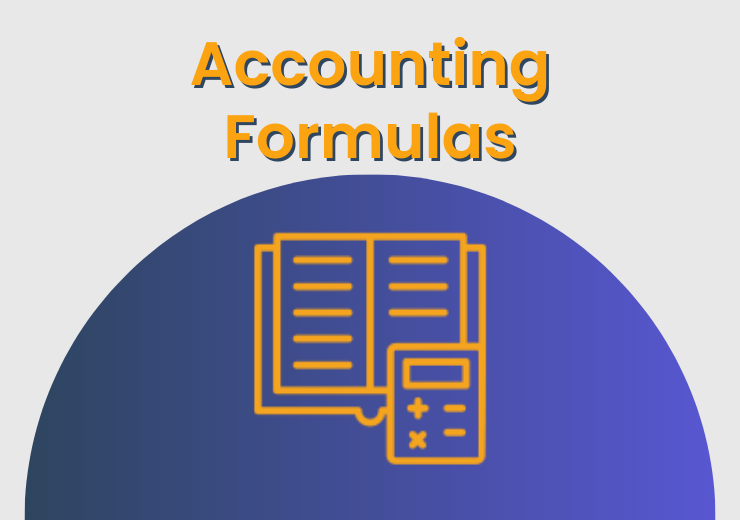Introduction to Accounting Formulas
In the intricate world of finance, accounting formulas act as the backbone of sound decision-making and financial reporting. These formulas are not just numbers and symbols but powerful tools that simplify complex financial data, allowing businesses to gain insights into their financial health.
Importance of Formulas in Accounting
Streamlining Financial Processes
Accounting formulas play a crucial role in streamlining financial processes. They provide a systematic approach to recording, analyzing, and interpreting financial data. By following predefined formulas, businesses can maintain consistency in their financial practices.
Enhancing Accuracy
One of the primary benefits of using accounting formulas is the enhancement of accuracy in financial calculations. From basic revenue and expense formulas to complex financial ratios, these calculations reduce the likelihood of errors in financial reporting.
Facilitating Decision-Making
Formulas in accounting are not just about numbers; they translate into meaningful insights that drive decision-making. Whether it’s assessing profitability or evaluating investment opportunities, these formulas empower businesses to make informed choices.
Basic Accounting Formulas
Revenue Formula
Revenue=Quantity Sold×Unit PriceRevenue=Quantity Sold×Unit Price
Expense Formula
Expense=Cost Incurred+Operational CostsExpense=Cost Incurred+Operational Costs
Profit Formula
Profit=Revenue−ExpensesProfit=Revenue−Expenses
Advanced Accounting Formulas
Return on Investment (ROI)
ROI=(Net ProfitInvestment Cost)×100ROI=(Investment CostNet Profit)×100
Debt to Equity Ratio
Debt to Equity Ratio=Total DebtTotal EquityDebt to Equity Ratio=Total EquityTotal Debt
Gross Margin Percentage
Gross Margin Percentage=(Gross ProfitRevenue)×100Gross Margin Percentage=(RevenueGross Profit)×100
Net Present Value (NPV)
NPV=∑(Net Cash Inflow(1+Discount Rate)�)−Initial InvestmentNPV=∑((1+Discount Rate)nNet Cash Inflow)−Initial Investment
The Role of Formulas in Financial Statements
Financial statements, such as the income statement and balance sheet, heavily rely on accounting formulas. These statements provide a snapshot of a company’s financial performance, making it crucial to use accurate and reliable formulas.
Common Challenges in Using Accounting Formulas
Misinterpretation
Despite their importance, accounting formulas are prone to misinterpretation. This is often due to a lack of understanding or misapplication of the formulas, leading to incorrect financial analyses.
Data Inconsistency
Inconsistencies in financial data can pose challenges when applying accounting formulas. It is essential to ensure data accuracy and consistency to derive meaningful results.
Tips for Effectively Using Accounting Formulas
Regular Updates on Market Trends
To enhance the effectiveness of accounting formulas, businesses should stay informed about market trends. Adapting formulas to reflect changes in the business environment ensures relevance and accuracy.
Utilizing Software Solutions
Modern accounting software solutions simplify the application of formulas. Automation not only reduces the risk of errors but also improves the efficiency of financial processes.
Real-world Examples of Accounting Formulas
Case Study 1: Cost of Goods Sold (COGS)
COGS=Beginning Inventory+Purchases−Ending InventoryCOGS=Beginning Inventory+Purchases−Ending Inventory
Case Study 2: Earnings Per Share (EPS)
EPS=Net IncomeAverage Outstanding SharesEPS=Average Outstanding SharesNet Income
Importance of Continuous Learning in Accounting
The financial landscape is dynamic, with regulations and market trends constantly evolving. Continuous learning is essential for professionals to stay abreast of changes and adapt their use of accounting formulas accordingly.
The Future of Accounting Formulas
As technology continues to advance, the future of accounting formulas lies in their integration with artificial intelligence and machine learning. These innovations promise to further enhance the accuracy and efficiency of financial analyses.
Addressing Misconceptions about Accounting Formulas
Formula Complexity
Contrary to the misconception that accounting formulas are overly complex, many are straightforward and serve as invaluable tools for businesses of all sizes.
Accessibility to Non-Financial Professionals
Accounting formulas are not exclusive to financial experts. With user-friendly software and educational resources, non-financial professionals can grasp and apply these formulas to make informed decisions.
Conclusion
In the realm of accounting, formulas act as guiding lights, illuminating the path to financial clarity. From basic calculations to intricate financial ratios, these formulas empower businesses to make informed decisions, ensuring a robust financial foundation.
Frequently Asked Questions (FAQs)
-
Q: Are accounting formulas only for large businesses?
- A: No, accounting formulas are applicable to businesses of all sizes. They provide valuable insights for decision-making, regardless of the scale of operations.
-
Q: How often should accounting formulas be updated?
- A: Regular updates are advisable, especially in dynamic business environments. Stay informed about market trends and adjust formulas accordingly.
-
Q: Can accounting software replace the need for manual application of formulas?
- A: Accounting software can automate formula applications, reducing the risk of errors and improving overall efficiency.
-
Q: Are accounting formulas difficult to learn for non-finance professionals?
- A: No, with user-friendly software and educational resources, non-finance professionals can easily understand and apply accounting formulas.
-
Q: What is the future of accounting formulas?
- A: The future involves integration with artificial intelligence and machine learning, promising enhanced accuracy and efficiency in financial analyses.

